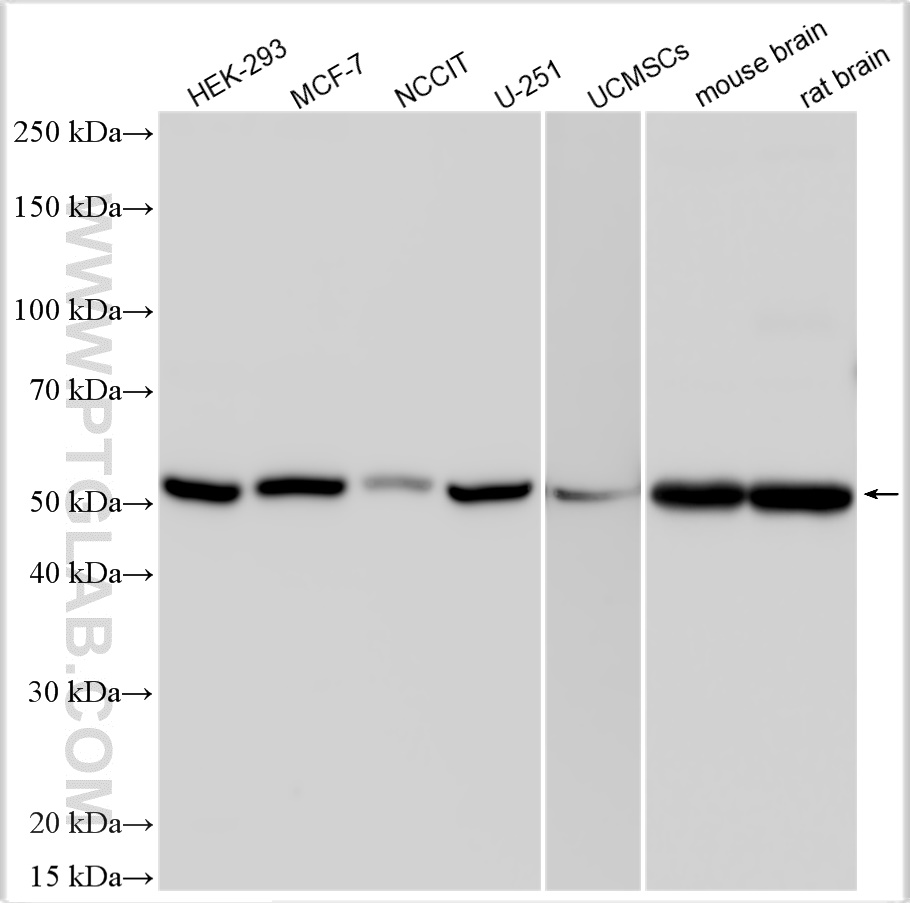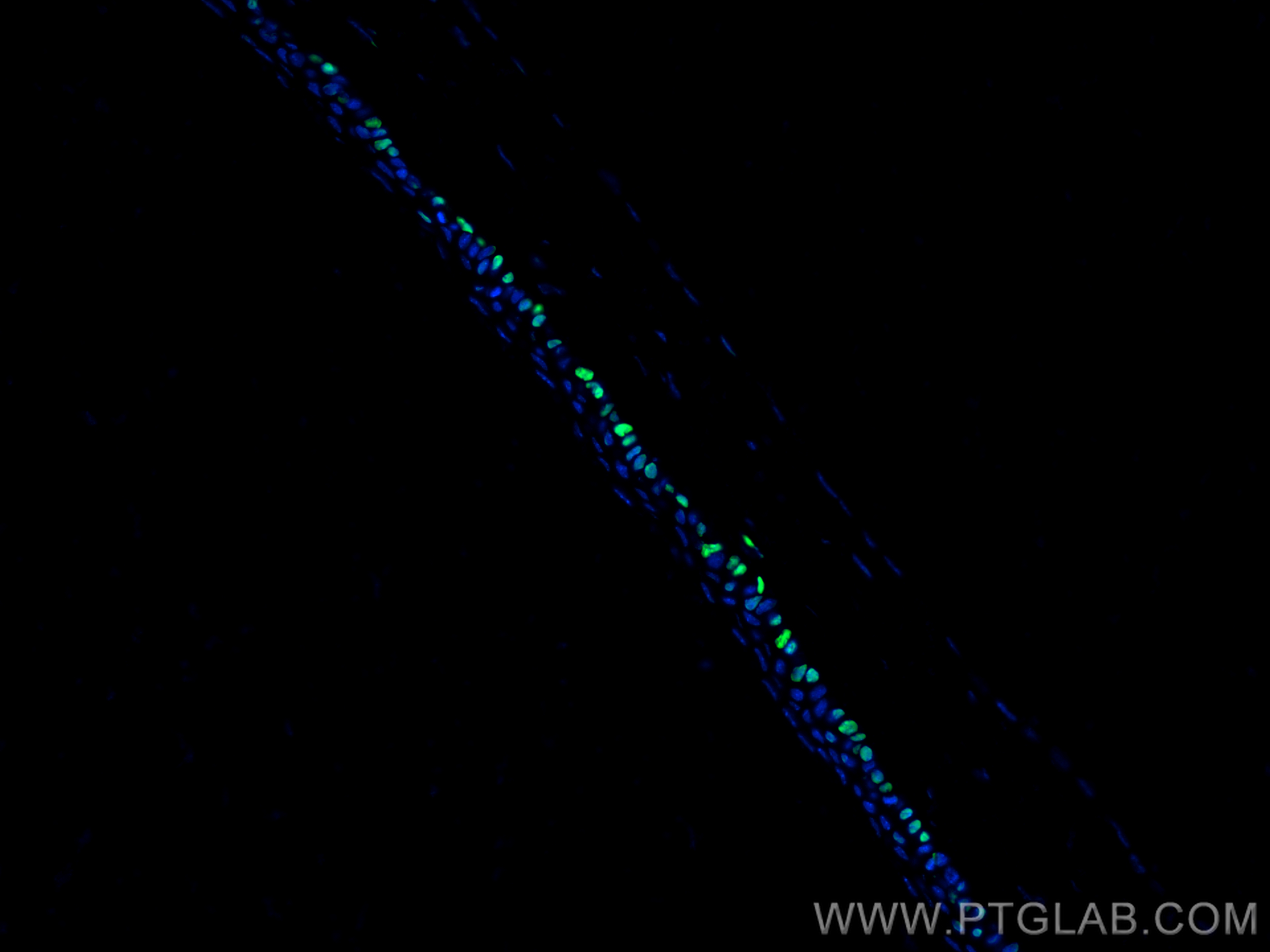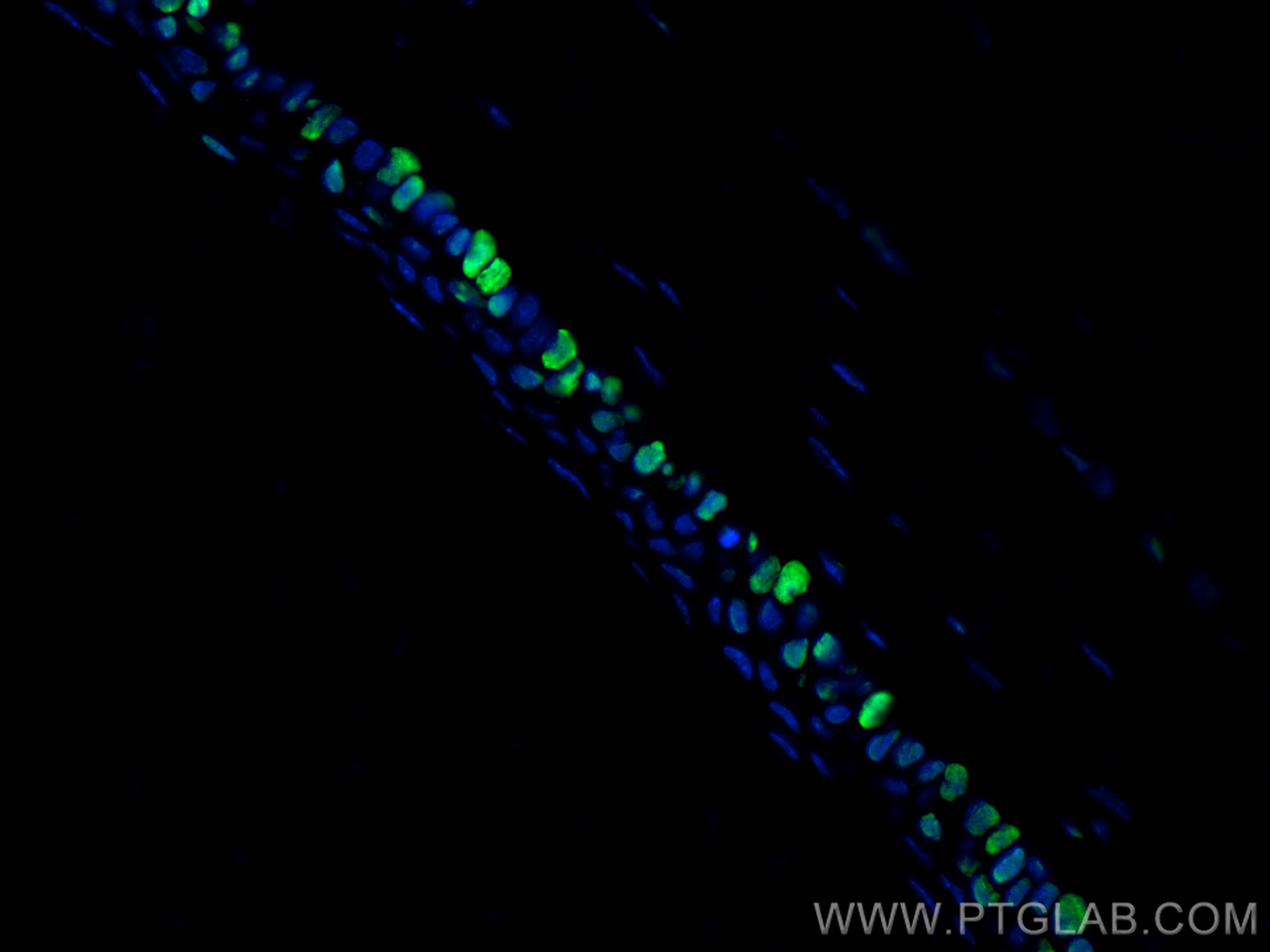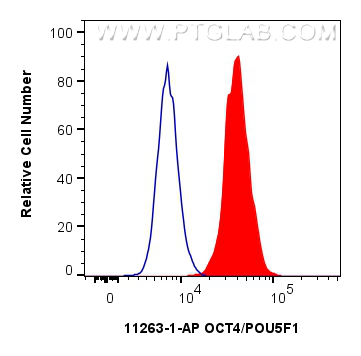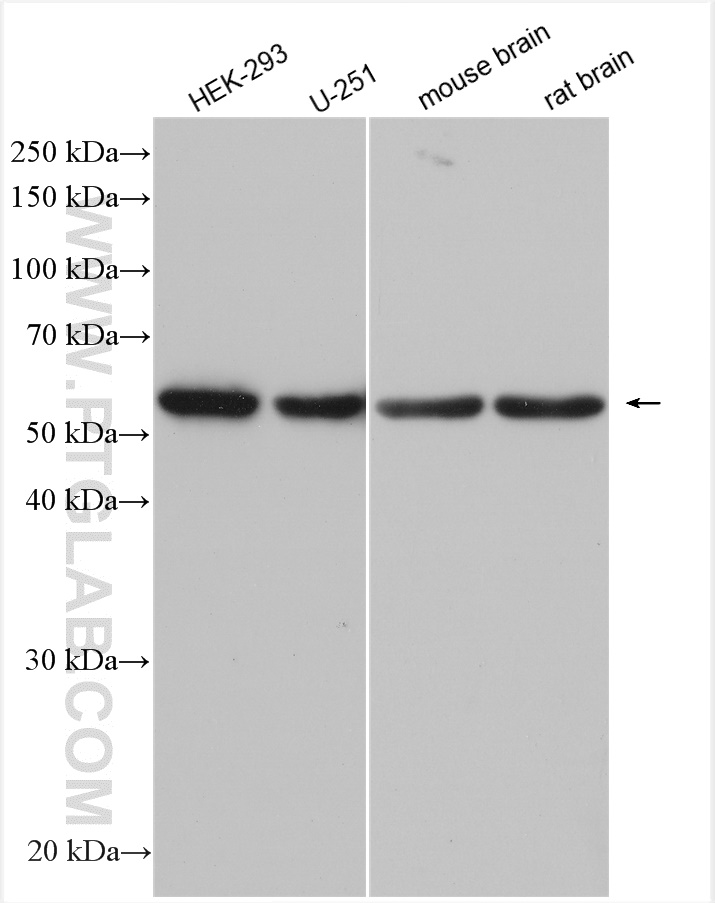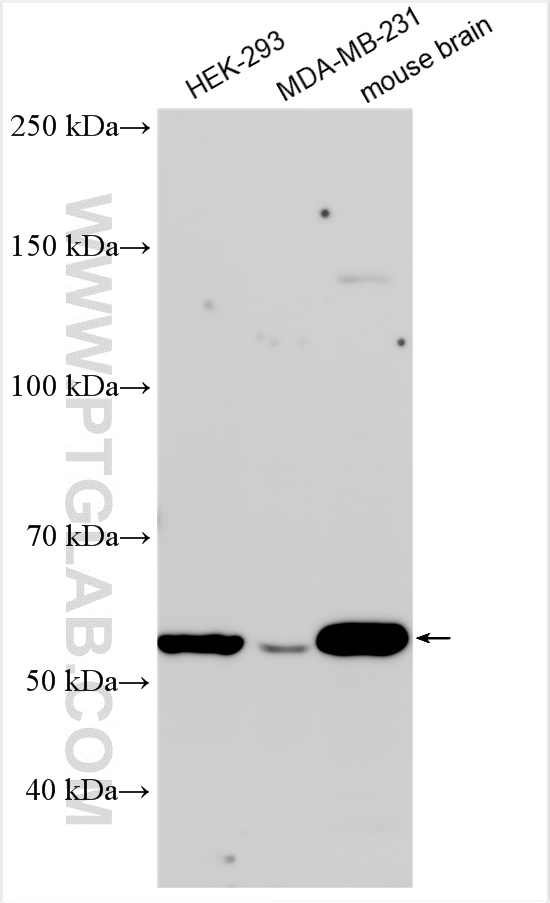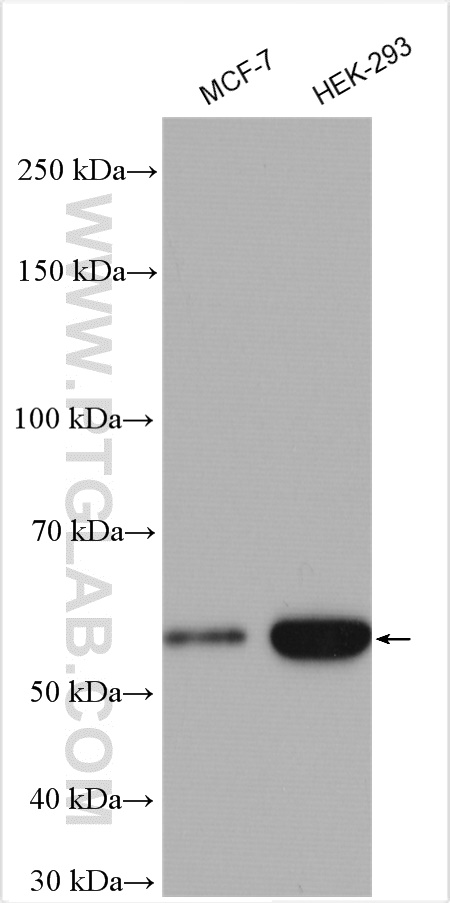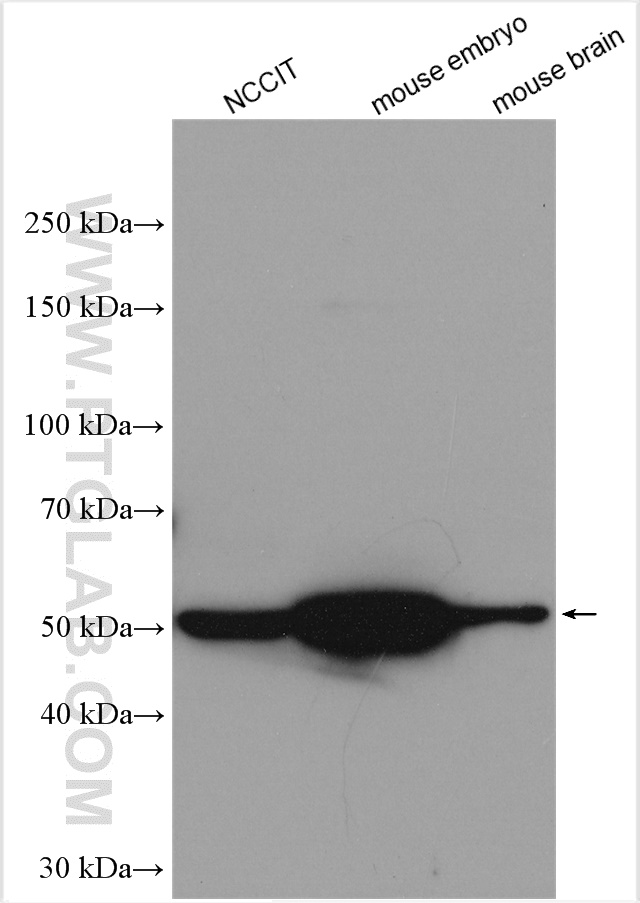验证数据展示
经过测试的应用
| Positive WB detected in | HEK-293 cells, MCF-7 cells, NCCIT cells, MDA-MB-231 cells, mouse brain tissue, U-251 cells, rat brain tissue, mouse embryo tissue |
| Positive IF-P detected in | mouse eye tissue |
| Positive FC (Intra) detected in | NCCIT cells |
推荐稀释比
| Application | Dilution |
|---|---|
| Western Blot (WB) | WB : 1:1000-1:5000 |
| Immunofluorescence (IF)-P | IF-P : 1:50-1:500 |
| Flow Cytometry (FC) (INTRA) | FC (INTRA) : 0.25 ug per 10^6 cells in a 100 µl suspension |
| It is recommended that this reagent should be titrated in each testing system to obtain optimal results. | |
| Sample-dependent, Check data in validation data gallery. | |
产品信息
11263-1-AP targets OCT4/POU5F1 in WB, IP, ELISA applications and shows reactivity with human, mouse, rat samples.
| Tested Applications | WB, ELISA Application Description |
| Cited Applications | WB, IP |
| Tested Reactivity | human, mouse, rat |
| Cited Reactivity | human, mouse, rat, pig, goat |
| Immunogen | OCT4/POU5F1 fusion protein Ag1794 种属同源性预测 |
| Host / Isotype | Rabbit / IgG |
| Class | Polyclonal |
| Type | Antibody |
| Full Name | POU class 5 homeobox 1 |
| Synonyms | OCT4, POU5F1, Octamer-binding protein 4, Octamer-binding protein 3, Oct-4 |
| Calculated Molecular Weight | 39 kDa |
| Observed Molecular Weight | 50-60 kDa |
| GenBank Accession Number | BC020712 |
| Gene Symbol | POU5F1 |
| Gene ID (NCBI) | 5460 |
| RRID | AB_2167545 |
| Conjugate | Unconjugated |
| Form | Liquid |
| Purification Method | Antigen affinity purification |
| UNIPROT ID | Q01860 |
| Storage Buffer | PBS with 0.02% sodium azide and 50% glycerol pH 7.3. |
| Storage Conditions | Store at -20°C. Stable for one year after shipment. Aliquoting is unnecessary for -20oC storage. |
背景介绍
Background
Octamer-binding protein 4 (OCT4), also known as POU5F1 or OCT3/4, is a member of the POU gene family and encoded by the human gene POU5F1 (POU domain class 5 transcription factor 1). OCT4 is a member of the Octamer class of transcription factors that recognize the 8-base pair consensus motif 5'-ATGCAAAT-3'. Expression of OCT4 is associated with an undifferentiated, pluripotent stem cell phenotype and tumors. OCT4 is also expressed in the developing brain, with the highest levels found in the cortex, olfactory bulb, and the hippocampus.
What is the molecular weight of OCT4?
The molecular weight of OCT4 is 38 kDa.
What are the isoforms of OCT4?
The human POU51F gene consists of five exons located on chromosome 6 and can generate three mRNA isoforms through alternative splicing - OCT4A, OCT4B, and OCT4B1 (PMID: 18787205). OCT4A and OCT4B1 orchestrate gene transcription in the nucleus supporting self-renewal and pluripotency maintenance in ESCs and embryonal carcinoma cells, whereas OCT4B is localized in the cytoplasm in various non-pluripotent cell types and cannot sustain self-renewal and pluripotency.
What is OCT4's involvement in pluripotency and self-renewal?
OCT4 forms a trimeric complex with SOX2 and DNA to control the expression of genes involved with embryonic development, such as FGF4 (PMID: 10801796), UTF1 (PMID: 10409735), or even NANOG (PMID: 15743839). OCT4 is critical for early embryogenesis (PMID: 9814708) and for embryonic stem cell pluripotency (PMID: 16153702). High levels of OCT4 are associated with the ability to self-renew, which is emphasized by OCT4 gene knockdowns promoting differentiation (PMID: 10742100). OCT4 is also one of the four key transcription factors used to generate induced pluripotent stem cells (iPSCs) by reprogramming fibroblasts to a pluripotent state (PMID: 16904174).
实验方案
| Product Specific Protocols | |
|---|---|
| WB protocol for OCT4/POU5F1 antibody 11263-1-AP | Download protocol |
| IF protocol for OCT4/POU5F1 antibody 11263-1-AP | Download protocol |
| Standard Protocols | |
|---|---|
| Click here to view our Standard Protocols |
发表文章
| Species | Application | Title |
|---|---|---|
Mol Cell Temporal proteomics during neurogenesis reveals large-scale proteome and organelle remodeling via selective autophagy | ||
Bone Res Type II collagen-positive progenitors are important stem cells in controlling skeletal development and vascular formation. | ||
J Exp Clin Cancer Res Membrane RRM2-positive cells represent a malignant population with cancer stem cell features in intrahepatic cholangiocarcinoma | ||
J Pineal Res Melatonin inhibits the stemness of head and neck squamous cell carcinoma by modulating HA synthesis via the FOSL1/HAS3 axis | ||
Theranostics Carcinoma-associated fibroblasts promote the stemness and chemoresistance of colorectal cancer by transferring exosomal lncRNA H19. | ||
Mol Ther Exosomal miR-1246 from glioma patient body fluids drives the differentiation and activation of myeloid-derived suppressor cells. |
